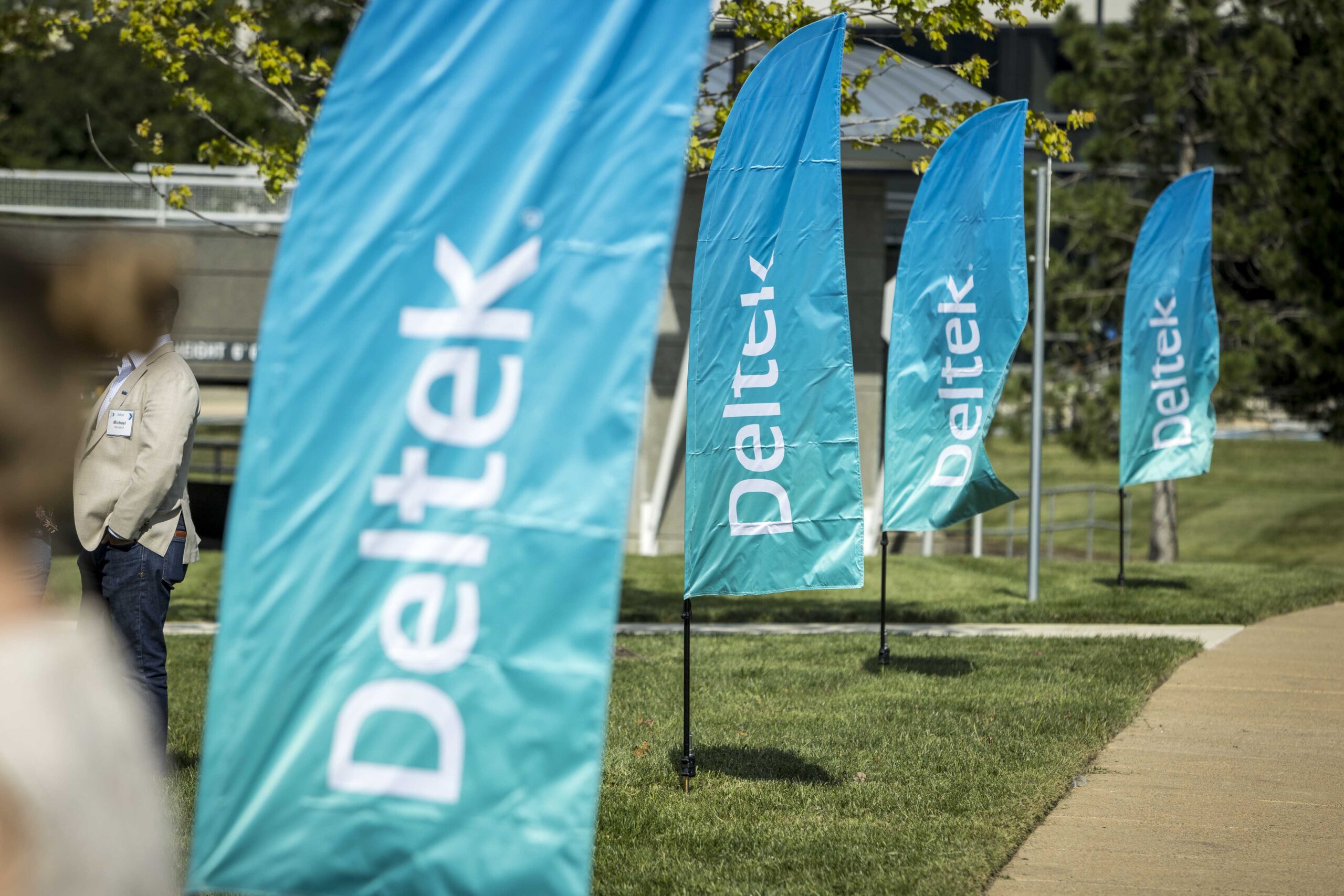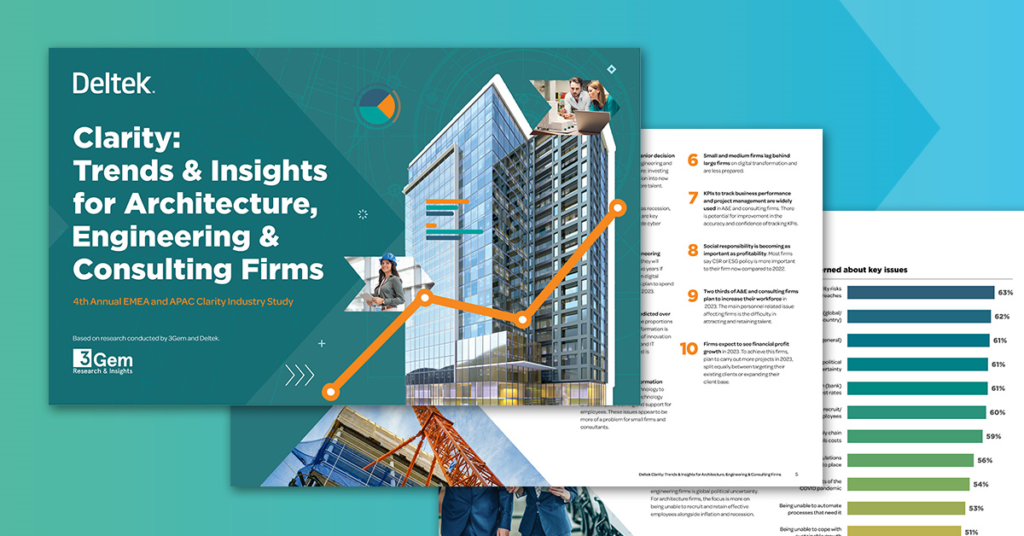
Megan Miller, Director, Product Marketing, Deltek
Given the dynamic macroeconomic landscape, characterised by recession, inflation, and increasing interest rates, industries across the board have faced challenging market conditions in 2022. This includes architecture and engineering (A&E) firms, which must carefully choose their projects to navigate these global demands. However, despite these obstacles, there is a prevailing sense of optimism among business leaders. In fact, 71% of A&E and consulting firms say that, compared to 2022, they are expecting to increase profits in 2023.
The 4th Annual Deltek Clarity EMEA and APAC Industry Study revealed that business leaders are placing a significant emphasis on digital transformation as a crucial driver for growth. In fact, almost three out of four (74%) respondents expressed concerns about losing market share within two years if substantial progress in digital transformation is not made. Alongside digital transformation, firms in 2023 are continuing to prioritise finding essential talent and developing robust environmental, social, and governance commitments.
Although faced with challenges, firms that adopt a strategic approach to the projects they undertake can better navigate this uncertain time. By considering certain criteria, they can more accurately assess the viability of new projects. This includes evaluating whether they have sufficient staff with the appropriate skills to manage the projects they win, as well as determining if shortlisted opportunities will be profitable and aligned with the firm’s goals. However, this must be done as a holistic exercise, as addressing these considerations individually will not provide a comprehensive understanding of where time and resources should be invested to foster growth.
To gain insights into emerging trends and market challenges, Deltek conducted its 4th Annual Deltek Clarity EMEA and APAC Industry Study. This study seeks input from architecture, engineering and consulting industry leaders to understand their perspectives, challenges and opportunities.

The struggle to adopt automation
Digital transformation has provided architecture and engineering (A&E) firms with an opportunity to take a more strategic approach to technology across the business. However, despite the potential for cost and time savings, investing in technology can be challenging for businesses with limited resources, especially when there are multiple infrastructure priorities to address simultaneously.
For instance, more than half of companies (51%) in this year’s Deltek Clarity report stated that their ability to adopt artificial intelligence is a top challenge for project management in 2023. And while firms are looking for ways to take advantage of emerging technologies, there are still many areas of the business that are ripe for automation and improved workflows. A large percentage of firms (86%) are reliant on manual data entry for a project’s financial data.
In light of the fact that a majority of firms (74%) acknowledge that failing to make progress in digital transformation will result in a loss of market share within two years, 79% are planning to increase their investments in emerging technologies in 2023. The research reveals that data science (87%) is the emerging technology deemed most crucial for their success, closely followed by other technologies such as big data (83%), artificial intelligence (AI) (83%), and robotic process automation (82%). The latter, in particular, has the potential to enhance profitability by streamlining manual tasks and enabling staff to focus on more critical responsibilities. Therefore, it is essential for companies to invest in education on these technologies to address knowledge gaps within their teams.
At present, the research reveals that most firms feel prepared to some extent to implement their top prioritises for digital transformation (92%), with a further 40% saying they are ‘very’ well-prepared. As such, the first step towards implementing those technology investments should be to critically evaluate existing business processes to identify inefficiencies. Firms can then pinpoint opportunities to automate and streamline workflows using technology. A key aspect of this process is ensuring that the people involved understand the value of transitioning from outdated processes and systems to more time and cost-saving approaches.
Tackling the talent crisis
While employee turnover is steadying, almost every firm is grappling with multiple challenges when it comes to finding and retaining talent. Moreover, the cost of hiring new employees is increasing, making it difficult for firms to strike a balance between attracting new talent and meeting the needs of existing staff.
In the midst of intense competition for talent, companies must adopt a more strategic approach to attracting fresh recruits. While competitive compensation packages remain crucial, they merely serve as a foundation. As 67% of firms intend to expand their workforce this year, understanding the wants and needs of a modern workforce is essential. Given the obstacles of achieving work/life balance and ensuring engagement, business leaders must go above and beyond to establish a thriving company culture that is focused on the employee.
To engage a diverse pool of candidates and employees, firms are shifting to focus more on employee engagement and retention. This includes offering opportunities for upskilling, training and career development. Additionally, firms should leverage operational tools that facilitate project and workforce success. Forward-thinking businesses have already begun implementing visible career development plans to engage talented employees and retain staff members seeking long-term professional growth opportunities. This approach has proven effective in mitigating the negative effects of attrition, staffing shortages, and unfilled positions on a firm’s overall well-being.
Firms investing in DE&I
Business leaders continue to prioritise enhancing the employee experience and that goes beyond simply the type of projects employees work on, but their perception of the company as a whole. The report revealed a growing interest in establishing and nurturing internal diversity, equity, and inclusion (DE&I) programs within architecture and engineering (A&E) firms, although there are hurdles to overcome for successful implementation.
A significant proportion of architecture, engineering and consulting firms – approximately 39% – have implemented diversity, equity, and inclusion (DE&I) initiatives that include specific goals. Additionally, a further 36% are actively developing practices and policies related to DE&I, albeit without a formal strategy in place. A small percentage (4%), have not implemented any DE&I initiatives and do not have plans to introduce changes within the next two years.
It is worth noting that positive advancements in diversity hiring and pay equity not only serve as effective tools for attracting and recruiting candidates, but also have a measurable impact on financial performance. According to McKinsey, businesses in the top quartile for gender diversity on executive teams were 25% more likely to achieve above-average profitability compared to companies in the bottom quartile.
For the second half of 2023, the focus is on accomplishing more with fewer resources. As the competition for talent intensifies, firms must not only differentiate themselves as excellent places for career advancement, but also prioritise investment in meaningful DE&I improvements. There continues to be optimism and opportunities for digital maturity and investment while improving processes to better position firms for the road ahead.
